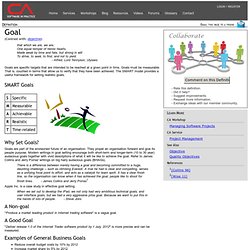

Paul Wind
28 years old. Born on a Friday the 13th. I worked construction for years after high school, then joined the army. I was injured in combat and decided to get out. Now I attend college at FSCJ and work as a junior network admin.
Proof of Concept 7. Proof of Concept 6. Proof of Concept 5. Proof of Concept 4. Proof of Concept 3. Proof of Concept 2. Proof of Concept 1. Week 3. Week 4. Week 5. Week 6. Paul Wind CNT 4931 Goal Setting. Project Management. SMART Goals. Once you have planned your project, turn your attention to developing several goals that will enable you to be successful.

Goals should be SMART - specific, measurable, agreed upon, realistic and time-based. A goal might be to hold a weekly project meeting with the key members of your team or to organise and run a continuous test programme throughout the project. The acronym SMART has a number of slightly different variations, which can be used to provide a more comprehensive definition for goal setting: S - specific, significant, stretching M - measurable, meaningful, motivational A - agreed upon, attainable, achievable, acceptable, action-oriented R - realistic, relevant, reasonable, rewarding, results-oriented T - time-based, time-bound, timely, tangible, trackable This provides a broader definition that will help you to be successful in both your business and personal life.
When you next run a project take a moment to consider whether your goals are SMART goals. SMART Goals Specific Measurable. Creating S.M.A.R.T. Goals — Top Achievement. Specific Measurable Attainable Realistic Timely Specific: A specific goal has a much greater chance of being accomplished than a general goal.

*Who: Who is involved? *What: What do I want to accomplish? *Where: Identify a location. *When: Establish a time frame. *Which: Identify requirements and constraints. *Why: Specific reasons, purpose or benefits of accomplishing the goal. EXAMPLE: A general goal would be, “Get in shape.” Measurable - Establish concrete criteria for measuring progress toward the attainment of each goal you set.
When you measure your progress, you stay on track, reach your target dates, and experience the exhilaration of achievement that spurs you on to continued effort required to reach your goal. To determine if your goal is measurable, ask questions such as…… How much? How will I know when it is accomplished? Goals and Objectives. That which we are, we are; One equal temper of heroic hearts, Made weak by time and fate, but strong in will To strive, to seek, to find, and not to yield. - Alfred, Lord Tennyson, Ulysses Goals are specific targets that are intended to be reached at a given point in time.

Goals must be measurable. That is, couched in terms that allow us to verify that they have been achieved. The SMART model provides a useful framework for setting realistic goals. Why Set Goals? Goals are part of the envisioned future of an organisation. There is a difference between merely having a goal and becoming committed to a huge, daunting challenge -- such as climbing Everest.